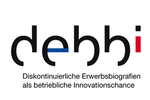DEBBI
Discontinuous careers as an opportunity for innovation - Developing the innovative potential of older workers through new design and systems of innovation
Project Coordination:
Forschungsinstitut für innovative Arbeitsgestaltung und Prävention (FIAP) e.V.
Munscheidstr. 14, 45886 Gelsenkirchen
Tel.: + 49 (0) 209 - 31 99 81 74
E-Mail: r.klatt @
@ fiap-ev.de
fiap-ev.de
Grant number: 01HH11052-54
Duration: 11/2011 - 04/2015>7p>
DEBBI is funded by BMBF and the EU / ESF as part of the collaborative project programme: Working Learning Developing Skills for Innovation in a Modern Working Environment, and falls under the funding priority: innovation and demographic change. Innovation, at all levels of society, is regarded as a key indicator of competitiveness in the modern world. As a rule innovation is associated with youth, or the younger end of the workforce. There is a growing fear at political and entrepreneurial levels of a decline in innovation and creativity, due to present, and forecast, demographic changes, which could have a strong impact on German competitiveness.
The overall objective of the project is to use the examples of the IT industry to examine and report on the success and failure of innovation and design from older employees. Special focus will be put on the impact of discontinuous careers, conditions for innovation, the individual as well as managerial and social factors.
The research results will enable the development of instruments to analyse the innovative potential of those with discontinuous careers, and then make them available publicly. The combined project team has 2 scientific partners (FIAP and IPP) and 2 practical partners (adesso AG and gaus GmbH). They will use the research results to develop tools and instruments, for use by entrepreneurial and existing companies, to cluster and connect existing competences in order to release the innovative potential which is becoming available through demographic change. The main study is taking place in Germany, with concurrent studies are taking place in 3 neighbouring European countries. The aim is to gauge the innovative potential of older workers and those with discontinuous careers, compared to the concepts which IT companies use to assess innovative potential. At all levels, the investigation focuses on innovative potential and is not based on potential innovation deficits of older workers; the investigation pays specific attention to skills which arise from non-linear career paths. The tools developed in the practical element of the project help to identify a 'red thread' of competences developed through working lives and how to promote the development of new skills for workers.




